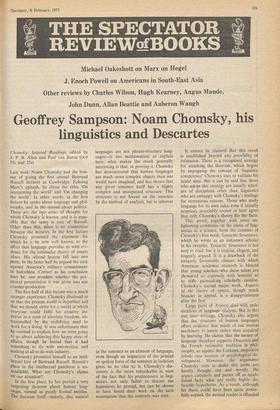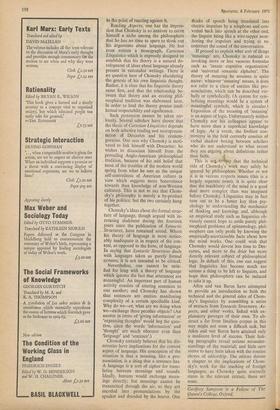(':x7 THE SPECTATOR REV1EWofBOOKS
Michael Oakeshott on Marx on Hegel J. Enoch Powell on Americans in South-East Asia Other reviews by Charles Wilson, Hugh Kearney, Angus Maude, John Dunn, Allan Beattie and Auberon Waugh
Geoffrey Sampson: Noam Chomsky, his linguistics and Descartes
Last week Noam Chomsky had the hon- our of giving the first annual Bertrand Russell lectures at Cambridge. Echoing Marx's epitaph, he chose the titles 'On interpreting the world' and 'On changing the world'. In other words, in the first lecture he spoke about language and phil- osophy, and in the second about politics. These are the two areas of thought for which Chomsky is known, and it is argu- able that the same is true of Russell. Other than this, there is no connection between the lectures. In the first lecture Chomsky presented the argument for which he is by now well known, to the effect that language provides us with evi- dence for the rationalist theory of innate ideas. His second lecture fell into two parts. In the latter half he argued the case against America's military commitment in Indochina. Correct as his conclusion may be. one wonders whether the pol- emical presentation it was given was not counter-productive.
The first half of this lecture was a much stranger experience. Chomsky disclosed to us that the present world is imperfect and that we should strive for a world in which everyone could fulfil his creative im- pulses in a state of absolute freedom. un- trammelled by the stultifying need to work for a living. It was unfortunate that he omitted to explain how we were going to go about achieving this happy state of affairs, though he hinted that it had something to do with universities, and nothing at all to do with industry.
Chomsky presented himself as an intel- lectual heir of Bertrand Russell. Russell's place in the intellectual pantheon is un- assailable. What are Chomsky's claims on our attention?
In the first place, he has proved a very surprising theorem about human lang- uages, viewed as purely formal entities. The theorem itself—namely, that natural languages are not phrase-structure lang- uages—is too mathematical to explain here; what makes the result generally interesting is that, in proving it, Chomsky has demonstrated that human languages are much more complex objects than one would have imagined, and has shown that any given sentence itself has a highly complex and unexpected structure. This structure is not forced on the sentence by the method of analysis, but is inherent in the sentence as an element of language, even though an inspection of the printed or spoken form of the sentence in isolation gives us no clue to it. Chomsky's dis- covery is the more remarkable in view of the fact that his predecessors in ling- uistics not only failed to discuss the hypothesis he proved, but can be shown to have based their work on the tacit assumption that the contrary was true. It cannot be claimed that this result is established beyond any possibility of refutation. There is a recognised strategy for attacking the theorem, which begins by impugning the concept of 'linguistic competence' Chomsky uses to validate his initial data. But it can be said that those who adopt this strategy are usually schol- ars of disciplines other than linguistics who are unhappy with Chomsky's findings for extraneous reasons. Those who study language for its own sake, even if initially sceptical, invariably sooner or later agree that only Chomsky's theory fits the facts.
This proof, together with some en- lightening comments on the status of ling- uistics as a science, form the contents of Chomsky's first book, Syntactic Structures, which he wrote as an unknown scholar in his twenties. Syntactic Structures is not easy to read: but it is concise, elegant, and cogently argued. It is a drawback of the uniquely favqurable climate with which American academic research is blessed that young scholars who show talent are • showered so copiously with honours as to stifle painstaking scholarly caution. Chomsky's second major work, Aspects of the theory of syntax, though much broader in appeal, is a disappointment after the first.
Large parts of Aspects deal with tech- nicalities of language analysis. But in this and later writings, Chomsky also argues that the structure of human languages offers evidence that much of our mental machinery is innate rather than acquired by learning. He claims that the nature of language therefore supports Descartes and the French rationalist tradition in phil- osophy, as against the Lockean. empiricist tabula rasa account of psychological de- velopment. However, the arguments Chomsky uses to make this point are hastily thought out and woolly. He argues circularly and passes off as estab- lished facts what are really highly de- batable hypotheses. As a result, although his thesis could have been quite power- fully argued. the neutral reader is offended to the point of reacting against it Reading Aspects, one has the impres- sion that Chomsky is so anxious to carve himself a niche among the philosophers that he has no time to spare to think out his arguments about language. He has even written a monograph, Cartesian Linguistics which is expressly designed to establish that his theory is a natural de- velopment of ideas about language already present in rationalist writings. There is no question here of Chomsky elucidating the genesis of his own linguistic thought. Rather, it is clear that his linguistic theory came first, and that the relationship be- tween that theory and an existing phil- osophical tradition was elaborated later, in order to lend the theory greater intel- lectual respectability and significance.
Such pretension cannot be taken ser- iously. Several scholars have shown that the thesis of Cartesian Linguistics depends on both selective reading and misrepresen- tation of Descartes and his contem- poraries. One sees why Chomsky is moti- vated to link himself with Descartes: he wishes to dissociate himself from the prevailing Anglo-American • philosophical . tradition, because of his odd belief that most of the troubles of the modern world spring from what he sees as the unique self-centredness of American culture (a view which suggests more benevolence towards than knowledge of non-Western cultures). This is not to say that Chom- sky's philosophy is merely a by-product of his politics; but the two certainly hang together.
Chomsky's ideas about the formal struc- ture of language, though argued with in- creasing shakiness during the fourteen years since the publication of Syntactic Structures, have remained sound. Where his theory of language is most notice- ably inadequate is in respect of the con- tent, as opposed to the, form, of language. In saying that Syntactic Structures deals with languages taken as purely formal systems, it is not intended to be critical.
Nevertheless, one cannot be satis- fied for long with a theory of language which ignores the fact that utterances are meaningful. An important part of human activity consists of uttering sentences to one another; and Chomsky has shown that sentences are entities manifesting complexity of a certain specifiable kind. Why do we—or, what are we doing when we—exchange these peculiar objects? (An answer in terms of 'giving information' or `expressing thoughts' would beg the ques- tion, since the words 'information' and `thought' are much obscurer even than `language' and `sentence'.) Chomsky certainly believes that his dis- coveries have implications for the content aspect of language. His conception of the situation is that a meaning, like a pro- nunciation, is a thing that a sentence has. A language is a sort of cipher for trans- lating between meanings and sounds. Ideally, humans would exchange mean- ings directly; but meanings cannot be transmitted through the air, so they are encoded into pronunciations by the speaker and decoded by the hearer. One thinks of speech being translated into electric impulses by a telephone and con- verted back into speech at the other end, the linguist being like a wire-tapper mon- itoring the impulses and trying to re- construct the sound of the conversation.
If pressed to explain what sort of things `meanings' are, Chomsky is reduced to invoking more or less vacuous formulae such as 'innate cognitive organisation' and `universal semantic alphabet'. The theory of meaning he assumes is quite naive: whatever 'meaning'. means, it does not refer to a class of entities like pro- nunciations, which can be described ver- bally or symbolically. (A system for sym- bolising meanings would be a system of meaningful symbols, which is circular.) Exposition of the meaning of `meaning' is an aspect of logic. Unfortunately neither Chomsky nor his colleagues appear to have more than a superficial knowledge of logic. As a result, the liveliest con- troversy in the field currently consists of verbal shadow boxing between scholars who do not understand to what extent they are arguing about definitions rather than facts.
This is nc4-to'ay that the technical side of Chomsky's work may safely be ignored by philosophers. Whether or not it is in various respects innate (this is a largely separate issue), it is quite clear that the machinery of the mind is a good deal more complex than was imagined before Chomsky. Linguistics may in fact turn out to be a better key than psy- chology to understanding the mechanics of thinking and knowing; and, although an empirical study such as linguistics ob- viously cannot hope to settle purely phil- osophical problems of epistemology, phil- osophers can only profit by knowing the empirically-ascertainable facts about how the mind works. One could wish that Chomsky would devote less time to Des- cartes, and more to the drier but more directly relevant subject of philosophical logic. In default of this, one can suggest that linguistics has become much too serious a thing to be left to linguists, and hope that philosophers can be induced to take it up.
Allen and van Buren have attempted to provide an introduction to both the technical and the general sides of Chom- sky's linguistics by assembling a series of extracts from Syntactic Structures, As- pects, and other works, linked with ex- planatory passages of their own. To ab- stract a far from limitless corpus in this way might not seem a difficult task, but Allen and van Buren have attained only a mediocre level of success. Their link- ing paragraphs reveal serious misunder- standings of the material; and little care seems to have been taken with the routine chores of editorship. The editors devote a chapter to the implications of Chom- sky's work for the teaching of foreign languages; as Chomsky quite correctly states in the relevant extract, there are none.
Geoffrey Sampson is a Fellow of The Queen's College, Oxford.



































 Previous page
Previous page